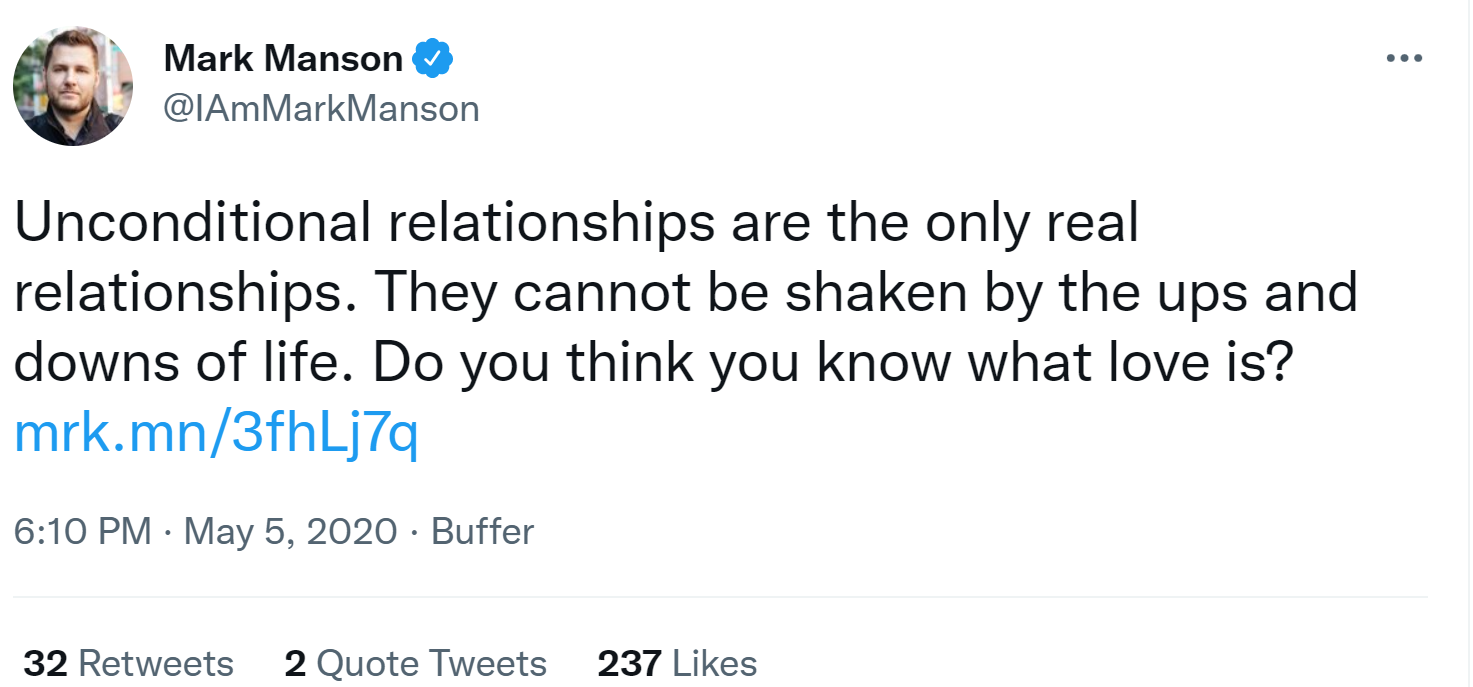Unconditional Love. Part II (Romantic Relationships)
Modern relationships can, at times, feel more like contracts than actual love. A lot of the debate on the internet is about who brings what to a relationship, what is received for love shown, etc. The paradox here is that while we crave love in its most idealistic form (i.e pure and unconditional love), we choose love primarily based on what we will gain (power, status, money, excitement, personal value, etc.). Such an orientation leaves us overly concerned with conditions that must be present in and around a potential partner, yet none of these conditions matter for the longevity of romantic associations. Loving someone means we care about their well-being just as much as we care about our own, or even more. It may seem counterintuitive, but it is the only way to build sustainable relationships.
This post is a continuation of the previous one where we discussed unconditional love from a deistic point of view. In this second installment, — also drawn from a conversation with Pastor Jeffery Walter of Cafan Media —, we discuss what the principles of unconditional love in romantic relationships are and why we must apply them. While the ideas expressed here are in the context of romantic associations, they can be applied to any kind of relationship.

The Discussion
Q. Can Romantic Attachments be based on unconditional love?
A. Romantic attachments, in their beginning stages, are usually not true love. At this stage, our attraction to another person may be based on what we want for ourselves. A union forged out of this sort of attraction alone is self-centered, so the love from it will destroy itself if it continues this way. Suppose we are with someone only because of what we’ll gain. In that case, we’ll eventually discover that the person is not perfect. Ultimately, what we want from the person may not matter to us anymore, causing the love to become doused. However, this type of attraction can be a first step in bringing two people together.
It is desirable that it moves on from this first state into unconditional love, where we love the person for the sake of the person. If we love someone for the sake of the person, then we are not motivated by what we get from that person, or what the person does, or our self-centered desires, but we are driven by the good we want for the person, so we do well towards the person.
Q. How does this play out in our relationships?
A.Unconditional love in relationships or in marriages is a bit different. In Unconditional love part 1, we learn that God is all-sufficient, so we do not give him anything. The only thing we can give God is how we allow Him to love us. However, in the marriage between two people, it is not enough for one person alone to give all the love; that makes the relationship one-sided.
Inasmuch as a person must focus on loving their partner, a secondary desire must go with it: adesire to receive love in return. This is the only way that oneness in marriage is attained. Anyone who wants the oneness of marriage should first love their spouse and wish that their spouse should love them in return. The order, however, must not be reversed. The primary love is what you have to give; it stands independently. The secondary love is what you receive in return. Secondary here means that it can be sacrificed for the primary. So even if your love is not met, the most important thing for you is to focus on loving your spouse (primary love). This kind of love is unconditional.
Q. So what happens when our love for another is not returned and there’s no union?
Love is revealed in what it seeks to achieve in a person and its quality is in its purpose. If someone you love decides that they no longer love you or is no longer interested, then the quality of the love you have for that person changes. It changes because the purpose of that love is no longer to the end of marriage or is no longer romantic in nature. The purpose now could be for friendship or for the sake of anything good other than marriage. The love, even though its purpose is changed, if unconditional, never dies.
Unconditional Love is a must
Greater love hath no one than this, than to lay down one’s life for his friends….You did not choose me, but I chose you.
— Jesus Christ
Developing a penchant for unconditional love can be challenging yet very rewarding. Aside from the possibility of being able to feel another person’s joy as your own, – which is the greatest joy there is – there are many other reasons for wanting to develop a tendency towards unconditional love.
Our love matures as a result.
There are times when we claim we love others when in reality, the love we show is only a means of getting something in return. As a result, we get very manipulative in relationships, and when things don’t go our way, we get angry. This sort of behaviour leads to quarrels, arguments, fights, and even murder in some instances.
Unconditional love demands that we develop a more outward-looking attitude when it comes to love, focusing on the good things we can give without thoughts of recompense. In relating to other people this way, we are challenged to look beyond their shortcomings (if possible), to learn to forgive, to let things go, to be kinder and more caring. If we are loved in return, then there’s union. If not, our love remains unsullied, and we’ve most likely become better people for it.
It helps to eliminate the negativity and ill feelings that are associated with “love”:
Have you ever loved someone and felt deep anxiety as a result? Maybe you thought if you didn’t do the right things at the right time, you’ll eventually miss out. On the flip side, you may “loved” someone and done so many things for this person who is the object of your love. If only this person reciprocated your love in the way you wanted, you would be fine.
Conditional love is predicated on what we will receive for the love we have shown. Since there is no guarantee that we will get it, we get anxious and emotionally unstable. This instability leads to all sorts of mental anguish. The alternative is to aim for our love to be constant regardless of what we get from this person. This is how we know we truly love someone, and it only comes when we set about to love that person unconditionally.
Another fictitious Example
Since the triangle is the strongest shape, it will make for a great illustration of the concepts we’ve discussed. The idea here is that, for any two people, the closer they get to unconditional love for each other, the closer they get to each other. This concept will be demonstrated with a story about John and Jane, with a focus on John.
John meets Jane and feels very attracted to her. Before he met Jane, he had a lot going on for himself. He had everything under control, and everything he added to his life was added to increase his joy. Now that he likes Jane, he applies the same principle: maximize gain; minimize pain. His focus is still entirely on himself, though he claims he loves Jane. John doesn’t realize that Jane is a human being full of her own emotions and personal desires, not an object to him happy.
Eventually, the relationship becomes one-sided. John only seems interested when he wants something from Jane. At the same time, Jane cannot unite herself with John because her love for John is only reciprocated when she does certain things. In time, John becomes a domineering force, always dictating, and when things do not go his way, he looks elsewhere. John has missed the boat on what it means to love someone, and this is what the state of their relationship looks like:
In time, John comes to realize the error of his ways. He notices that his self-centeredness in chasing his personal happiness, primarily, is creating a rift between Jane and himself. John has a change of heart and decides to love Jane without setting demands on her. He decides to seek ways in which he can be more useful or loving to her. As he does this, he notices a deeper connection to Jane with this new approach to their relationship
Conclusion
The hallmark of love is not loving ourselves but loving others and being united to others through love,
- Divine Love and Wisdom by Emanuel Swedenborg
While having conditions is not a bad thing, it is only a preliminary stage of attraction, and we should develop unconditional love out of this initial attraction. If we only care about what we’re getting, then the other person is but a tool for us to seek selfish pleasure.
While this talk about unconditional love may sound idealistic, the concept is not alien to us. It is something we are accustomed to in our relations with friends and family. In most of such cases, we are not looking for what we stand to gain, so everything we do for them is from a genuine concern for their well-being. With our romantic partners, however, we tend to expect more, causing a lot complications.
Having dealt with the whats and whys of unconditional love, we can now turn to the hows. One huge concern we have mostly is, how do we go about loving and caring for other people’s well-being in a way that prevents them from taking advantage of us? It is a delicate balance, but it is achievable. Obtaining this balance will be the subject of part III of the unconditional love series.
Until then, remember that there is more blessing in giving than receiving.



